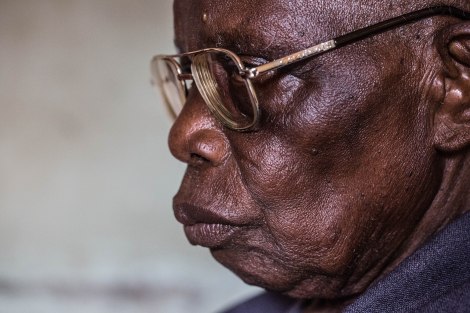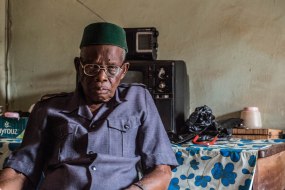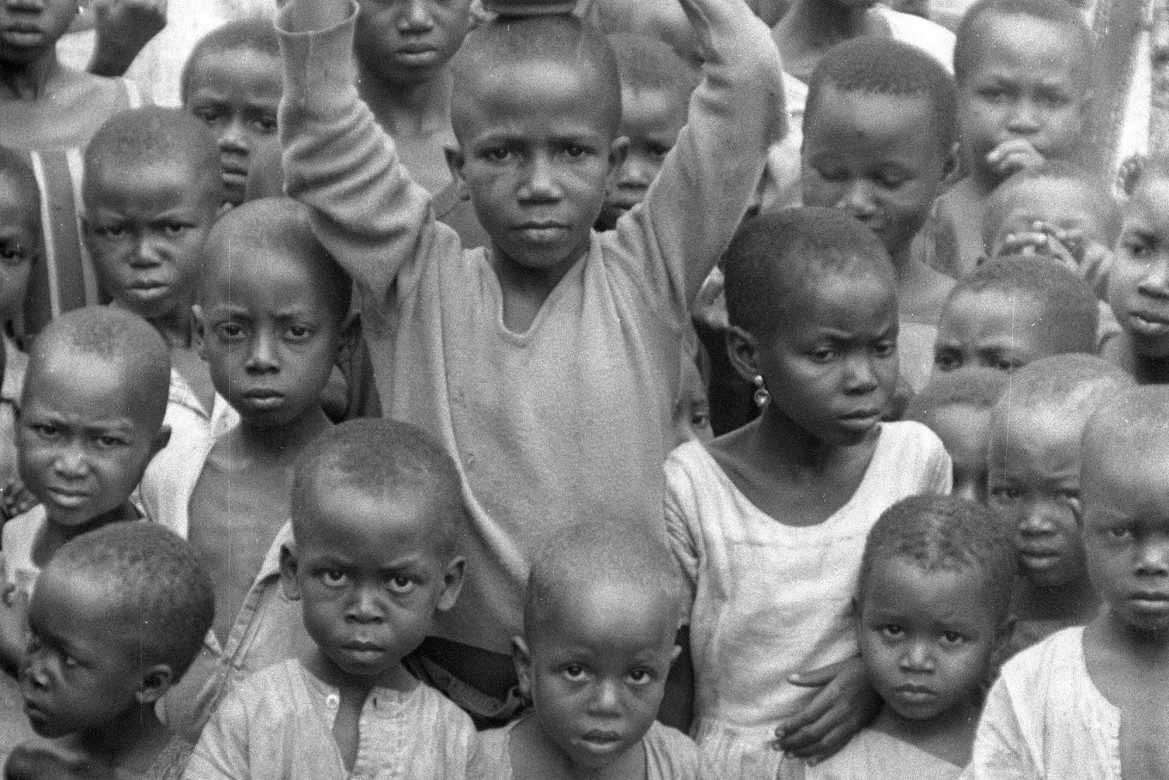My name is Patrick Obute. I was born when just a few individuals went to school. When I started working for the government, my name was written as David. I was born on June fourteenth 1942.
I was born here in Okpuje-Ani [in Enugu State, Nigeria].

Patrick Obute remembers the Nigerian-Biafran War. Photo by Chika Oduah.
Yes [I remember the first coup in January 1966].
I remember 1966 because that time Aguiyi-Ironsi was overthrown. I was in Ibadan and it reached one certain Saturday when the first coup was carried out that led to the killing of [Samuel] Akintola, [Festus] Okotie-Eboh and so many of them. This was the first coup. After that coup, Aguiyi-Ironsi now came to power. In that very year, because Aguiyi-Ironsi did not last up to a year, when he took over, he went on a tour around Nigeria and came to Ibadan in 1966 to visit [Lt. Colonel Francis Adekunle] Fajuyi. That was where Aguiyi-Ironsi was caught and killed in Ibadan.
In Ibadan, we lived in Mokuna [sic] and we were doing a work called “kwagala” which is wood work. Other days, we do stay in Olegabari [sic] which is a village in Ibadan after Ijebu Ode you move to a place called roundabout towards Lagos. So it was in Olegabari that we lived but on weekends, we would come back to Mokuna to stay. That is where our village is.
I was working on my own not for the government. During that time, in 1964, I was already a grown man and as a grown man aspiring for work to do, I went to Ibadan where some of our brothers and friends were living.
Who are you to them?
We were where we usually do wood work and we heard about the coup. We came out and went to Mokuna. We met someone who came from the East that told us about the coup; that so many people have been killed including Akintola and others.
We came out from the bush where we were doing our wood work and entered the town in Mokuna and there was riot everywhere. So we went inside the house and locked ourselves.
Since they could kill top people in the country, who are you to them?

Patrick Obute. Photo by Chika Oduah.
If they see you they will just kill you. We locked ourselves for three good days because everywhere was unsafe and people were hiding themselves not to be killed. What people were chanting outside was “Hausa go”, “Hausa go.” The Yoruba people where the ones chanting “Hausa go.”
The first coup touched the whole Nigeria because people have been killed among the Yoruba, Hausa and Igbo and other places. There was no place that people were not killed. That was when Akintola, Tafawa Balewa and even the Sardauna of Sokoto and others were killed. The Hausas now asked why Nnamdi Azikiwe and M.I Okpara were not killed and they termed it an Igbo killing.
I was predominantly with Nsukka brothers and sisters in the house but there were also Onitsha people and Benin [people]. Because we were mixed up doing the work; so we were all together in the house.
I thought there would be trouble because that second coup made people to start going home…Because they brought the riot in a bid to retaliate the death of their members killed in the first coup…So we came back. The Hausas also commanded the Igbos to leave their land and the Igbos started coming back from the North and Igala.
They killed many people.
None of them [my siblings] were killed during the war. I have left Ibadan when the war broke out; so I was not there. I was in Okpuje [when Biafra was declared on May 30th 1967. I left Ibadan by the end of 1965.
Oh. I recollect. You know it’s been a long time so I have forgotten some of those things. I was really in Ibadan when Aguiyi-Ironsi was killed. When they said Igbo people should go; that was when I came back before 1967.
They said war was breaking out; that everyone should go now that the road is clear. The rumors were high. People were saying it. So when we heard the rumors, I decided to leave. I didn’t have radio then because everybody was running at that time. We were just hearing everything from people. My parents were all dead before then. My siblings were telling me to return because all of them had returned from Igala where they were doing farm work. One is Ugwoma, another is Isaac Obute, another is Isaac Ugwueke. All of them were in Okpuje
[I] came back with bus [from Ibadan to the East. I know about myself only. I came back home while others went to their homes. You don’t check how many people in the bus. You are only concerned about yourself.

Patrick Obute. Photo by Chika Oduah.
People were in confusion because most of them have never seen war. Farmers in Kogi state left their yam and came back home and the Kogi indigenes were harvesting the yams to themselves because they left everything.
How I came to know then was that, one certain month, those Igala people in Kogi state told the Igbos to come and harvest their yams or other crops. When they got there, they found out those yams have been harvested. That day that they went, the Igala people also seized their bicycles from them. That was when they saw that their crops and yams have been harvested.
We were terrified and we ran away
Some other persons from the east that stayed with me in Ibadan refused to come back, saying that the war will not start. Then I started to come back.
We were happy [by the declaration of Biafra]. We felt everyone should be on their own. The Igbos on their own; the Hausas on their own. The same thing with the Yorubas.
[I stayed here in Okpuje throughout the entire three years of the war.] The Nigerians soldiers came here, burnt all these places along this axis and killed so many people down to Nsukka. Not that they came here particularly, but along the road. Houses were burnt and people were killed. They killed all those they see on the road.
When they were burning and killing people, nobody was here, we all ran to Nrobo, a village inside Nsukka to hide inside the bush. Nobody was here.
We heard gunshots, we saw houses being burnt, so we were terrified and we ran away.
During the war, you don’t run and wait for anybody. You first of all, run to a far distance before waiting to look back. When you meet an Igbo person, you stay with him there. After a while, you continue with him.
We slept in the bushes [in Nrobo]. [So that a soldier will catch you and kill you]. We slept inside the bushes….you will sleep in the bush. But when it stops and everything is calm, you come out especially when you don’t hear the sound of guns and bombs. Then we will start asking “where are we now?” If they say they were in Orie market, we run back to the bush.

Patrick Obute’s hand. Photo by Chika Oduah.
We don’t count [how many days we are staying in the bush] because if they make noise, we run. Sometimes, they will tell people not to run, then we will come back to our houses.
Biafran soldiers didn’t conscript me because the Biafran soldiers too were running here. Those people came and the Biafran soldiers ran away to Nsukka.
The soldiers came when the northern soldiers were throwing bombs and rockets and it was making different sound and noise then the Biafran soldiers ran to Nsukka.
There was never a time I wanted to join [the Biafran army] because I don’t have the strength. I supported their cause. Even if it comes today, I will be very happy. I support it so that the Hausa people can be on there own and we, Igbos, will be on our own
I [didn’t] have anything to support their cause. Do I have money to give? But we were always happy whenever we see Nzogwu’s [sic] plane fly by. We will be dancing and rejoicing that our enemies are being defeated when we hear the sound of the bombing.
We didn’t see [Nigerian soldiers]. But whenever we hear them coming, we run. What we do is that we make fire and eat whatever we see. Nobody talks of taking bath. What are you doing with it? We dig the ground to make fire inside the bush and roast yam or anything. Sometimes, you will be cooking but when you hear the soldiers coming with their guns and bombs, we leave everything including our pots and run away.
If we stay in the bush about a week, we construct thatch roof with grasses. It is for temporal stay because we always move. We built in many places like Agbor and left it, built in Amagu and others and left them. There were many of them. If they say the soldiers are coming, we leave everything and run.
…We left [Nrobu because] all the Biafrans came to Nsukka so we left there and came back to Nsukka. We were known as farmers so food was not a problem. We never went hungry.
Don’t you know that we have boundary with Kogi people? So there were no refugees. We had none of them in our community. Nobody was coming because if you go to Okpuje, you will see that they have boundary with Igala people.
There is no time when you are happy during the war because when they came to our community, they killed many people. One time when we were very happy was when Biafran soldiers killed many of them in Onitsha with Ogbunigwe. We were happy that if all the northern soldiers were killed, we will be free and stay on our own.
When they surrendered, you know when they were killing people, everyone was struggling to protect their head. When we heard that Biafra had surrendered, we were in the farm and people started rejoicing that the war was over. Everybody was rejoicing. Nobody had anything in mind when we heard it.
They killed many people including our brothers… the ones killed by Nigerian soldiers in Onitsha at the battlefield.

Patrick Obute. Photo by Chika Oduah.
*This interview was conducted by Chika Oduah in Patrick Obute’s home in Enugu State, Nigeria.
